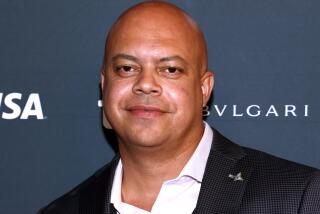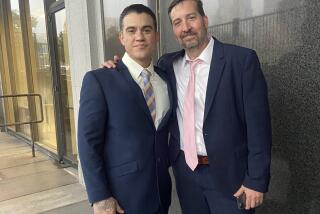Family Says Killer’s Sentence Is Too Light : Trial: William Barnes was found guilty of second-degree murder for slaying Carlos Vazquez. He could be paroled in 15 years despite prior conviction.
- Share via
POMONA — The second-degree murder conviction of paint-gun warrior and self-styled survivalist William Barnes last week for the slaying of Chicano activist and musician Carlos Vazquez brought only more pain, anger and bitterness to the victim’s family.
“In essence, the jury is saying somebody can kill someone who was active and giving to the community, and then 15 years later, (the murderer) can be back out in the streets to terrorize someone else,” said Miguel Vazquez, whose brother was killed at age 25. “The justice system really doesn’t work.”
The family had hoped for a first-degree murder conviction Friday that would have kept Barnes, 35, already a convicted murderer in North Carolina, behind bars for life. Instead, the twice-convicted murderer will be sentenced Sept. 9 in Pomona Superior Court to an indeterminate stay in prison, ranging from 20 years to life.
He could be paroled after 15 years, court officials said.
After the Jan. 2, 1986, shooting in which Carlos Vazquez was killed outside his El Monte home by a single, .22-caliber shot to the heart, family members immediately suspected Barnes, who had dated Vazquez’s wife, Dolores, before their marriage and reportedly harassed her after his death.
But police lacked evidence to arrest Barnes and the investigation remained at a standstill until two years ago, when Barnes’ cousin, Shara Ammen, stepped forward. Barnes had confessed the California killing to her, Ammen said. But by that time, the man who fancied himself as a military expert and falsely listed himself as an Army Green Beret and Vietnam veteran, had moved to North Carolina.
There he became entangled in another love triangle and Barnes, whose only battle experience was in paint-gun games--mock warfare conducted in the woods--was convicted of killing his rival with a .22-caliber gun.
With the information from Ammen, Barnes, serving a 25-year term in a North Carolina state prison, was extradited to California to stand trial. But because of the passage of time, Deputy Dist. Atty. Mike Davis said he decided to withhold from the jury mention of Barnes’ first murder conviction.
Under California law, prior convictions can be brought up in court to show state of mind, but not a defendant’s tendency to commit crimes, Davis said.
The distinction is subtle. And Davis said he did not want to risk violating that distinction by bringing up the North Carolina slaying. If Barnes had been convicted of first-degree murder, in part with the North Carolina case, a judge on appeal could have overturned the conviction and ordered a new trial, the prosecutor said.
“That could have been six to eight years down the line,” Davis said.
Thus, jurors never heard about the North Carolina killing with its striking similarities to Vazquez’s murder. When the case ended and jurors finally read newspaper accounts of the North Carolina murder, “they were all upset about it,” Davis said.
“They said: Gosh, if they had known that, they would have had no problem in deciding (on first-degree murder) at all,” the prosecutor said, recounting his conversation with jurors after the trial.
Meanwhile, defense attorney Alan Abajian said Barnes, who insists that he is innocent, was equally upset by the verdict.
When Barnes returns for sentencing, Miguel Vazquez said family members will ask that the California and North Carolina sentences run consecutively.
“If they do that, he would be 70 years old when he gets out,” Miguel Vazquez said. “This guy is a convicted murderer. . . . Somewhere, somebody’s got to get the clue that this man is dangerous and he doesn’t deserve to be on the streets.”
More to Read
Sign up for Essential California
The most important California stories and recommendations in your inbox every morning.
You may occasionally receive promotional content from the Los Angeles Times.













